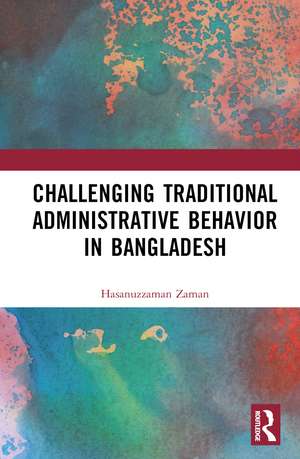Challenging Colonial Administrative Behavior in Bangladesh
Autor Hasanuzzaman Zamanen Limba Engleză Hardback – 27 oct 2023
Drawing on a host of published and unpublished materials, interviews with senior public officials, academics, representatives of international donor agencies, think tanks and non-governmental organizations, and a survey of more than 400 plus bureaucrats, the book analyzes the progress of digital government in Bangladesh from a soft, behavioral perspective. It will be of great interest to scholars and researchers of public policy and public administration, politics, innovation, and South Asian studies. It will be an essential reading for bureaucrats and government officials, as well as think tanks and NGOs.
| Toate formatele și edițiile | Preț | Express |
|---|---|---|
| Paperback (1) | 383.12 lei 6-8 săpt. | |
| Taylor & Francis – 30 ian 2025 | 383.12 lei 6-8 săpt. | |
| Hardback (1) | 1003.43 lei 6-8 săpt. | |
| Taylor & Francis – 27 oct 2023 | 1003.43 lei 6-8 săpt. |
Preț: 1003.43 lei
Preț vechi: 1223.70 lei
-18% Nou
Puncte Express: 1505
Preț estimativ în valută:
192.01€ • 209.41$ • 161.90£
192.01€ • 209.41$ • 161.90£
Carte tipărită la comandă
Livrare economică 24 aprilie-08 mai
Preluare comenzi: 021 569.72.76
Specificații
ISBN-13: 9781032523538
ISBN-10: 1032523530
Pagini: 208
Ilustrații: 10 Tables, black and white; 6 Line drawings, black and white; 6 Illustrations, black and white
Dimensiuni: 156 x 234 x 13 mm
Greutate: 0.47 kg
Ediția:1
Editura: Taylor & Francis
Colecția Routledge India
Locul publicării:Oxford, United Kingdom
ISBN-10: 1032523530
Pagini: 208
Ilustrații: 10 Tables, black and white; 6 Line drawings, black and white; 6 Illustrations, black and white
Dimensiuni: 156 x 234 x 13 mm
Greutate: 0.47 kg
Ediția:1
Editura: Taylor & Francis
Colecția Routledge India
Locul publicării:Oxford, United Kingdom
Public țintă
PostgraduateCuprins
Foreword by Jaideep C. Prabhu. Introduction. 1. Framing digital government paradox 2. Dual legacy of colonial rule and postcolonial military dictatorship 3. Rotation between political parties and military intervention (once again): 1991 to 2008 4. Digital government advancement: 2009 to 2021 5. Analyzing Empathy Training Program: A whole-of-government approach toward advancing digital service delivery innovation 6. Conclusion. Appendix I: Interview List
Notă biografică
Hasanuzzaman Zaman is now working for the federal government of Canada. Hasan completed his doctoral studies at the School of Public Policy and Administration, Carleton University in Ottawa in September 2021. He graduated with a distinction academic record in economics with politics from the University of Buckingham, United Kingdom (UK). After completing his postgraduate studies from the London School of Economics and Political Science (LSE) in London, UK, Hasan started his research career at the Centre for Policy Dialogue (CPD) in Dhaka, Bangladesh. In collaboration with the national statistical organization, Hasan led the first national-level census on the Union Digital Centers in Bangladesh, and co-authored the first background study on Digital Bangladesh for the Seventh Five Year Plan (2016-2020).
He worked for Copenhagen Consensus Center where he successfully managed and oversaw the research and policy outreach activities in Bangladesh (with BRAC and BRAC University), Haiti (with Global Affairs Canada) and India (with Tata Trusts). As a South-South policy consultant at one of the world’s largest philanthropy organizations, the Children’s Investment Fund Foundation in London, UK, Hasan led the first partnership on tracking global goals, between the governments of Bangladesh and Peru.
He worked for Copenhagen Consensus Center where he successfully managed and oversaw the research and policy outreach activities in Bangladesh (with BRAC and BRAC University), Haiti (with Global Affairs Canada) and India (with Tata Trusts). As a South-South policy consultant at one of the world’s largest philanthropy organizations, the Children’s Investment Fund Foundation in London, UK, Hasan led the first partnership on tracking global goals, between the governments of Bangladesh and Peru.
Descriere
This book studies public policy and administration in Bangladesh. It studies how, despite recording high-levels of corruption persistently, some governments in least developed countries (LDCs) like Bangladesh have achieved impressive online transformation level, through digital, electronic or e-Government implementation.
